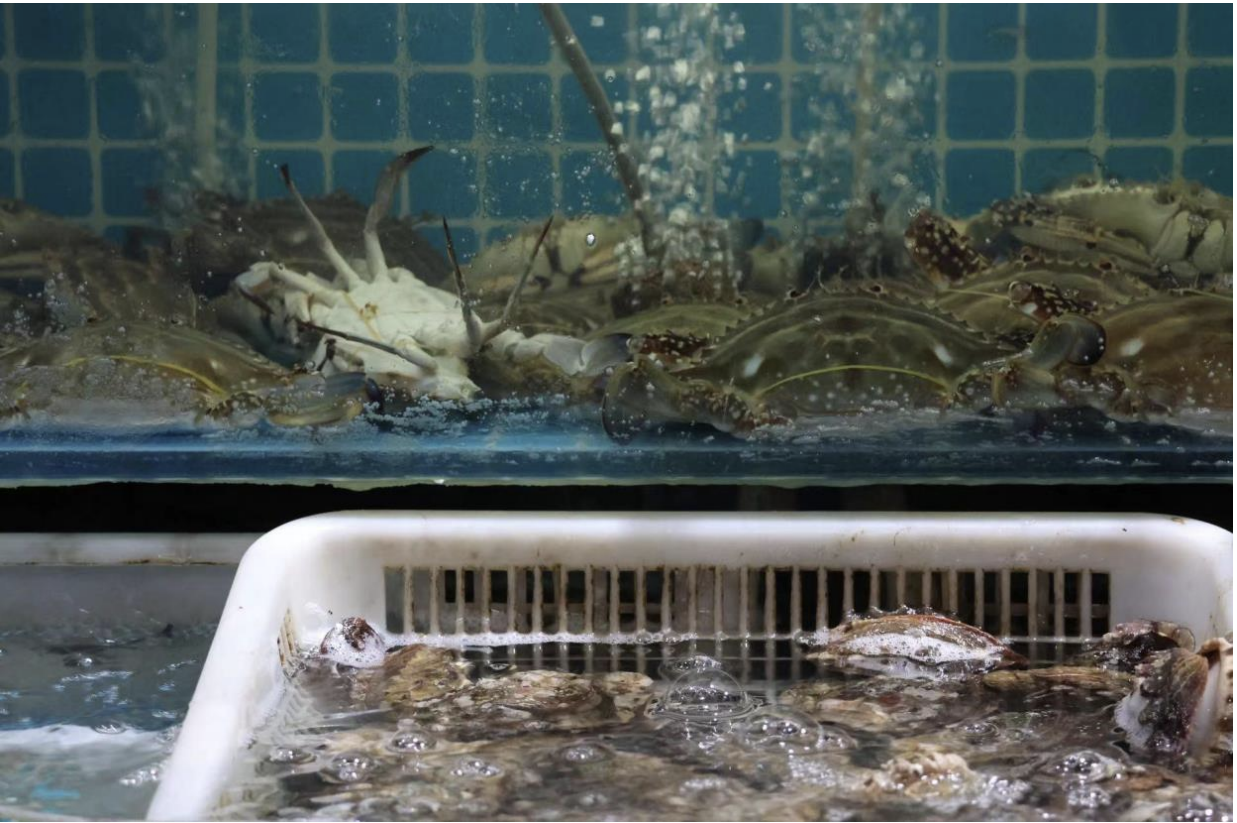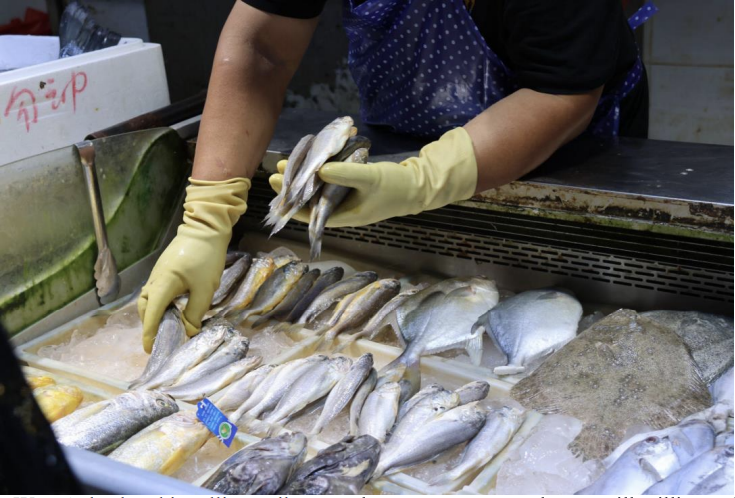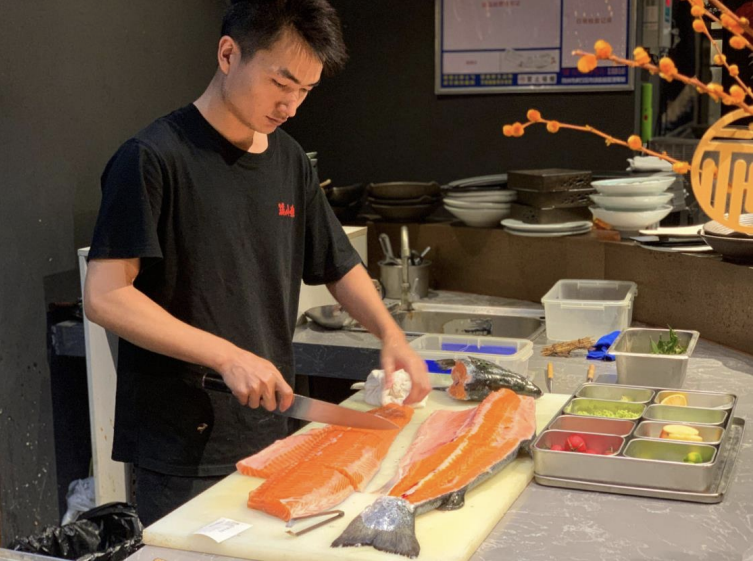
Hard Times for Local Seafood Businesses in the Wake of Japan’s Fukushima Wastewater Release
By Jasmine Ling, Yutong Shi, and Yanshan Lin
“The release has had a huge impact on us (seafood vendors). My husband also does the seafood business. My younger daughter is still in college, and she is by no means thrifty,” said Wang.

Hard Times for Local Seafood Businesses in the Wake of Japan’s Fukushima Wastewater Release
“The release has had a huge impact on us (seafood vendors). My husband also does the seafood business. My younger daughter is still in college, and she is by no means thrifty,” said Wang.

The seafood stall faces sluggish sales at the Xinzhen Food Market in Zhoushi, Kunshan, September 7, 2023. Taken by Jasmine Ling.
SUZHOU, Oct 25 – Ms. Wang, a 49-year-old seafood vendor of 20 years, is now sitting alone on the wooden stool by her stall at Xinzhen Food Market in the Zhoushi area of Kunshan. A spider has spun a web on her waterproof oversleeves hanging on the wall behind her, as Wang worries about her seafood business after Japan’s first Fukushima nuclear wastewater release into the Pacific Ocean on Aug 24th.
“The release has had a huge impact on us (seafood vendors). My husband also does the seafood business. My younger daughter is still in college, and she is by no means thrifty,” said Wang.
On Aug 24th, the Japanese government officially started to release the first batch of treated radioactive water from the Fukushima Daiichi nuclear power plant. It was approved by the U.N.’s nuclear watchdog, known as the International Atomic Energy Agency (IAEA), after a safety review under international safety standards. The release is a gradual process compiled of multiple batches, the BBC has reported – the first four of which are to be completed by the end of March 2024. The whole plan will last for at least 30 years.
The release has incurred strong condemnation from the Chinese government for public health and marine ecosystem concerns. “By dumping the water into the ocean, Japan has turned itself into a saboteur of the ecological system and polluter of the global marine environment,” said Chinese Foreign Ministry spokesperson Wenbin Wang at a press conference on the day of the wastewater release, as reported in the Associated Press. “It also violates people’s rights to health.”
China’s customs bureau followed with an immediate ban on all Japan’s aquatic products; the Japanese government responded by adamantly opposing and questioning the ban’s scientific basis, as it is likely to cause financial losses in the country’s seafood industry. According to Reuters, mainland China and Hong Kong were the biggest export markets for Japanese aquatic products in 2022, taking up 42% of all Japanese aquatic exports, and worth $600 million in total.
Fear of the wastewater has not only raised financial concerns in Japan but has also affected the Chinese domestic fishing industry on a significant scale. Across China, the total value of marine fishing amounted to 248.89 billion RMB (around $34 billion) in 2022, but with the direct impact of Japan’s nuclear wastewater release, that number is expected to drop by 24 billion RMB (around $3.28 billion) in 2023, according to data from Zhongshang Industrial Research Institute and Ministry of Agriculture and Rural Affairs of the People’s Republic of China. (*Zhongshang Industrial Research Institute describes itself as “ the first independent market data center in mainland China for corporate information and data research.”)
The wastewater release and the Chinese government’s tough stance against it has reignited long-held resentments among the Chinese population toward Japan. Chinese customers’ enthusiasm for seafood consumption has also cooled off over safety concerns. In response, many Japanese sashimi restaurants in Suzhou have changed their selling points from “Made in Hokkaido” to “Local” or “Made in Norway and Canada.”

Disclaimers on notice boards about the origin of seafood in Japanese restaurants in Huaihai Street, Suzhou, October 7, 2023. Taken by Jasmine Ling, Lynia Lin, and Ellen Shi
This is not the first time that these owners of Japanese restaurants – who are mostly of Chinese nationality – have faced difficulties. Even though their restaurants were heavily struck by demonstrators during the Sino-Japanese Diaoyu Islands dispute in 2012 – in which Chinese customers boycotted Japanese products due to the disagreement over the ownership of the islands – the loss appears to be much more serious this time.
“We are losing money almost everyday. I lost 98% of my customers. This is no joke,” said Linhong Zhou, president of the Suzhou Japanese Cuisine Association and the owner of the very first Japanese restaurant in Suzhou. “As of the 7-day Chinese National Holiday that just passed, our turnover shrank from 600,000 RMB (around $82,020) in 2021, to 378,000 RMB (around $51,673) last year, and to 60,000 RMB (around $8,202) this year,” Zhou said.

Zhou’s portrait in front of his restaurant and the Japanese cuisine in the restaurant. Shared by Linhong Zhou.
Zhou estimated that of over 800 Japanese restaurants in Suzhou, 50% will close down by the end of the upcoming Chinese Lunar New Year, and 70%-80% would not be able to survive by the end of February or March next year. “Yet, the Japanese restaurants are only a small part of the trillion-RMB-worth seafood industry, which is facing catastrophic damage amid the economic downturn in China,” Zhou said.
“The idea that eating seafood will lead to cancer has been carved into people’s minds,” Zhou sighed. “People still came to eat seafood after the Diaoyu Islands dispute, but this time it is different.” In response to the unfavorable situation, Zhou has introduced his hometown cuisine – Huai’an dishes, which include river fish – to cater to customers’ concerns, but the effects on improving his business remain negligible, he said.

Two fishermen from Lianyungang, Jiangsu Province selling their seafood and other items through a TikTok live platform but face harsh comments from viewers. Screenshot from TikTok.
Not only restaurants, but all stakeholders in the seafood industry have suffered, especially Chinese fishermen. On Aug 26th, fishermen in Jiangsu and Zhejiang Province received harsh criticism from netizens when advertising fresh seafood on Tik Tok’s live platform. “Go home!” “Variant fish!” “You’ll get cancer if you eat them!” read some of the comments, criticizing the quality of the seafood being sold. The fishermen became emotional and terminated the live broadcast due to the comments.
For at least one Kunshan local seafood vendor, the influence of the wastewater release lingers in daily trade. At the Xinzhen Food Market in Kunshan, fewer customers came to Wang’s stall since Aug 24th, she said, and there was a sharp decline in sales in the first several days after the wastewater release.
“I used to sell at least 25-30 kilograms of clams per day,” said Wang, “but now it’s only about 10 kilograms.

Ms. Wang’s husband is selling yellow croakers to customers who are still willing to buy seafood after the wastewater release, September 7, 2023. Taken by Jasmine Ling.
Among the customers who still come to buy seafood, some said they wanted to cherish the last chance to consume safe seafood before the wastewater reaches China’s coast, 240 days after the wastewater was first released. The alert period is based on a simulation conducted by Tsinghua University, which was first published in 2021 and has been widely circulated on Chinese social media.
A female customer in her 50s, who used to be a local school teacher, appealed to view the event more rationally. She attributed the public backlash to online media hype, saying that “the wastewater would be diluted by the sea, and the release is a gradual 30-year process, so the harm should be minimal.”
Linlin Kong, a chef aged 56 in a nearby family restaurant, dismissed the widely spread public concerns in another way. He believes that “as long as the seafood is sold on the market, the food should have passed the governmental quality test, so it is safe to consume it.”

A chef specializing in Japanese cuisine slicing fresh salmon for customers in the afternoon in Huaihai Street, Suzhou, October 7, 2023. Taken by Jasmine Ling.
The IAEA claims that the treated Fukushima nuclear wastewater will have little radiological effect on people and the environment, and the organization will continue monitoring it throughout the discharge phase. But the Chinese Foreign Ministry has repeatedly emphasized that “the Japanese government hasn’t addressed…the long-term reliability of the nuclear contaminated water purification equipment, the authenticity and accuracy of the nuclear contaminated water data, and the effectiveness of the release monitoring.”
Some analysts have interpreted the events between the two countries from a political stance. “This incident is more of a symptom than a cause of worsening Sino-Japanese relations,” Neil Thomas, a Chinese foreign policy expert affiliated with the Asia Society Policy Institute, said to BBC News. “Beijing may have made less of a fuss about the water release if its relationship with Tokyo was in a better place.”
On Oct 5, Japan began releasing the second batch of the wastewater, but this time, Chinese media has been quieter on social media platforms. CCTV-2 (China Central Television-2) is now promoting domestic seafood culture and cuisine through TV programs.
Back at the Kunshan market, besides the already high rent for her stall and unstable income, the release of the Fukushima wastewater is another heavy blow to Wang, the seafood vendor, and to her husband’s small business. She does not know whether the depressed seafood market after the release will be the final straw for her business.
Wang said most people still have confidence in the government’s capability of ensuring seafood security, but when asked about the future of continuing her business, she hesitated.
Her stall lease ended in September and she hasn’t signed the renewed contract.

The illustrations of the God of Wealth on the freezer and the spider web on the oversleeves, September 7, 2023. Taken by Jasmine Ling.
Jasmine (Yuchen) Ling

Jasmine (Yuchen) Ling is from Class of 2023, majoring in Institutions and Governance with a track in Political Science. She is an aspiring reporter on the interplay of Chinese politics and the country’s contemporary social problems, particularly on gender issues and marginalized groups.
Who is Yanshan Lin?

Yanshan Lin is a UG student from the class of 2026. Her intended major is molecular bioscience. She is eager to explore all kinds of human interactions in different ways.
Who is Yutong Shi?

Yutong Shi is from Class of 2024, majoring in Cultures and Movements in the track of Cultural Anthropology. She is interested in reporting marginalized groups and inequality issues. She plans to pursue Journalism after graduation.
Editors | Giulia de Cristofaro
Layout | Lexue Song 宋乐雪
Website | Josh Manto


credit: https://www.nngroup.com/articles/livestream-ecommerce-china/